- Home
- Mario Puzo
The Family Page 2
The Family Read online
Page 2
One beautiful Sunday, after he had served High Mass at Saint Peter’s Basilica, Cardinal Borgia invited his children to join him at the Vatican. This was a rare and courageous act, for until the time of Pope Innocent all children of the clergy were proclaimed to be their nephews and nieces. To openly acknowledge paternity could endanger an important appointment to any high church office. Of course, the people knew that cardinals and even Popes had children—everyone knew they sinned—but as long as it was hidden beneath the mantle of “family” and the truth of the relationship posted only in secret parchments, the honor of the office was not tarnished. Everyone could believe as they wished, but the cardinal had little patience for hypocrisy. There were times, of course, that he himself was forced to alter or embellish the truth. But that was understandable, for he was after all a diplomat.
Adriana dressed the children in their finest garments for this special occasion: Cesare in black satin and Juan in white silk, and two-year-old Jofre in a blue velvet jumper edged with rich embroidery. Julia dressed Lucrezia in a long peach lace dress, and placed a small jeweled headpiece upon the little girl’s white-blond curls.
The cardinal had just finished reading an official document brought to him from Florence by his senior advisor, Duarte Brandao. The document concerned a certain Dominican friar known as Savonarola. It was rumored that he was a prophet, inspired by the Holy Ghost, but far more dangerous to the purposes of the cardinal, every ordinary citizen of Florence rushed to hear Savonarola’s sermons and responded with great fervor. He was an acclaimed visionary and an eloquent preacher whose fiery speeches often raged against the carnal and financial excesses of the papacy in Rome.
“We must keep an eye on this simple friar,” Rodrigo Borgia said. “For great dynasties have often been brought down by simple men who believe they have a holy truth.”
Brandao was tall and thin, with long black hair and elegant features. He appeared gentle and amiable, yet it was rumored about Rome that no one could match his wrath when faced with disloyalty or insolence. Everyone agreed that only a fool would dare to make an enemy of him. Now, Duarte brushed his mustache with his index finger as he considered the implications of what Rodrigo Borgia had just told him.
Duarte told the cardinal, “There is word that the friar also attacks the Medici from the pulpit, and the citizens of Florence cheer.”
When the children entered Rodrigo Borgia’s private chambers, the conversation halted. Duarte Brandao greeted them with a smile, then stood aside.
Lucrezia rushed into the cardinal’s arms with excitement, but the boys stood back, their hands behind them. “Come, my sons,” Rodrigo said, still holding his daughter in his arms. “Come and give Papa a kiss.” He waved them toward him with a warm and welcoming smile.
Cesare reached his father first. Rodrigo Borgia lowered Lucrezia onto the small golden stool at his feet, and embraced his son. He was a strong boy, tall and muscular. The father liked the feel of this son; it reassured him about his own future. Rodrigo loosened his hold on the boy and then held him at arm’s length so he could look at him. “Cesare,” he said, fondly, “I say a prayer of thanks to Our Blessed Madonna each day, for you gladden my heart each time I behold you.” Cesare smiled happily, pleased at his father’s approval.
Then Cesare moved aside to make way for Juan. It may have been the speed of the younger boy’s heart or its frantic beating against his own chest, it may have been the quickness of his breath, signaling his nervousness, but some part of Rodrigo responded to Juan’s frailty. And when the cardinal embraced this son, he hugged him more gently but held onto him a little longer.
Usually, when the cardinal ate alone in his chambers, he ate sparsely, only bread, fruit, and cheese. But on this day he had instructed his servants to provide a table filled to excess with pasta and poultry, oxen with special sweetmeats, and round mounds of candied chestnuts.
As the children, Adriana and her son Orso, and the beautiful and charming Julia Farnese sat around the table laughing and chattering, Rodrigo Borgia felt like a fortunate man. Surrounded by family and friends, life on this earth was good. Silently he said a prayer of gratitude. When his manservant poured the blood-red wine into his silver goblet, he was filled with goodwill. And so, in a gesture of affection, he offered the first sip to his son Juan, who was seated next to him.
But Juan tasted the wine and made a face. “It’s too bitter, Papa,” he said. “I don’t like it.”
Rodrigo Borgia, always alert, suddenly froze with fear. This was a sweet wine; there should be no bitterness . . .
Almost immediately the child complained of feeling sick, and doubled over with stomach pains. Both his father and Adriana tried to reassure him, but only moments later Juan began to vomit violently. The cardinal lifted the boy from his seat, carried him into an anteroom, and placed him on the brocade couch.
The Vatican physician was called immediately, but before he could make his way to the chambers Juan had lost consciousness.
“Poison,” the physician declared, after examining the child.
Juan was white as death and already feverish, a thin stream of black bile running from his lips. He looked quite small and helpless.
Now Rodrigo Borgia lost his holy composure. He became furious. “A poison meant for me . . . ” he said.
Duarte Brandao, who had been standing by, now drew his sword, alert and watchful for any further attempts to harm the cardinal or his family.
The cardinal turned to him. “There is an enemy inside the palace. Gather everyone together in the Main Chamber. Pour them each a goblet of wine and insist that they drink it. Then bring me the one who refuses.”
Adriana, concerned, whispered, “My dear cousin, Your Worthiness, I understand your grief, but in this way you will lose your most trusted servants, for many will become sick and some will die . . . ”
Rodrigo turned to her. “I will not offer them the wine that was offered my poor innocent son. The wine they are offered will be pure. But only the sinner will refuse to drink, for his fear will choke him before he lifts the cup to his lips.”
Duarte left at once to carry out the cardinal’s orders.
Juan lay still as stone, pale as death. Adriana, Julia, and Lucrezia sat at his side, wiping his forehead with wet cloths and healing ointments.
Cardinal Rodrigo Borgia lifted his son’s small limp hand and kissed it; then he walked to his private chapel and knelt before the statue of the Madonna to pray. He reasoned with her, for he knew she understood the loss of a son and the pain it caused. And he vowed, “I will do everything in my power, everything humanly possible, to bring the immortal souls of thousands to the one true church. Your church, Holy Mother. I will see to it that they worship your son, if only you will spare the life of mine . . . ”
Young Cesare was standing in the doorway to the chapel, and when the cardinal turned to see him there, he had tears in his eyes. “Come, Cesare. Come, my son. Pray for your brother,” the cardinal said. And Cesare went to kneel beside his father.
Back in the cardinal’s chambers, everyone sat in silence until Duarte came back to announce, “The culprit has been discovered. He is but a kitchen boy, formerly in the employ of the House of Rimini.”
Rimini was a small feudal province on the eastern coast of Italy, and its ruler, a local duke, Gaspare Malatesta, was a formidable enemy of Rome and the papacy. He was a big man, his body huge enough to hold the souls of two, and his massive face was pitted and craggy, but it was for his hair, crinkled wild and red, that he was known as “The Lion.”
Cardinal Borgia moved away from the side of his ailing son, and whispered to Duarte, “Ask the kitchen boy why he holds His Holiness in such contempt. Then be certain he drinks the bottle of wine from our table. Be certain he drinks it all.”
Duarte nodded. “And what would you have us do with him once the wine has taken effect?” he asked.
The cardinal, his eyes glowing, his face flushed, said, “Place him on an ass, tether him t
ight, and send him with a message to the Lion of Rimini. Tell him to begin to pray for forgiveness and make his peace with God.”
Juan lay as though in a deep sleep for several weeks, and the cardinal insisted he stay at his palace in the Vatican to be treated by his personal physician. While Adriana sat by his side, and several maidservants cared for him, Rodrigo Borgia spent hours in the chapel praying to the Madonna. “I will bring to the one true church the souls of thousands,” he promised fervently. “If only you will plead with the Christ to spare the life of my son.”
When his prayers were answered, and Juan recovered, the cardinal became even more committed to the Holy Catholic Church and to his family.
But Rodrigo Borgia knew that heaven alone could no longer secure his family’s safety. And so he understood there was one more action to be taken: he must send to Spain for Miguel Corello, also known as Don Michelotto.
This bastard nephew of Cardinal Rodrigo Borgia had felt the tug of fate from his beginnings. As a child in Valencia he was neither mean nor sadistic, yet he often found himself defending those souls whose goodness made them vulnerable to the bullying nature of others. For often, kindness is mistaken for weakness.
Miguel, from the time he was a child, accepted his destiny: to protect those who carried the torch of God and the Holy Roman Church into the world.
But Miguel was a strong boy, and as ferocious in his loyalty as in his actions. As a burly teenager it was said that he had been attacked by the most savage bandit in his village when he stood to defend the house of his mother, the cardinal’s sister.
Miguel was but sixteen at the time, when the bandit leader and several young vandals entered their house and tried to move the boy away from the wooden chest in which his mother’s precious holy relics and family linens were hidden. When Miguel, who seldom spoke, cursed the bandits and refused to move away, the leader slashed his face with a stiletto, cutting across his mouth deep into his cheek. As blood ran in great streams down his face and onto his chest, his mother screamed, his sister began to cry in loud sobs—but Miguel stood fast.
Finally, as neighbors gathered in the streets and began shouting, the bandit and his gang, fearing capture, ran out of the village and into the hills.
Several days later, when this same pack of bandits tried to reenter the village, they were met with resistance; and while most fled, the leader of the pack was captured by Miguel. In the morning this unfortunate bandit was found with a heavy rope around his neck, hanging from a large tree in the village square.
From that day forward, Miguel Corello’s reputation for fierceness spread throughout the principality of Valencia, and no one dared do injury to him or any of his friends or family for fear of retaliation. His face healed, though it scarred so that his mouth was set in a constant grimace; but no other damage had been done. Though on any other man this sneer would be a frightening sight, Miguel’s reputation for fairness, and the look of mercy that radiated from his golden brown eyes, made everyone who saw him recognize his good soul. It was then that the villagers fondly began to call him Don Michelotto, and he became well known as a man to be respected.
Cardinal Rodrigo Borgia reasoned that in each family some must stand forward in the light and preach the word of God. Yet behind them must be others, to provide safety and ensure them success in their holy endeavors. Those who sat on the throne of the church could not defend themselves from the evil of others without the help of a human hand, for this was the nature of the world in which they lived.
That young Don Michelotto had been called upon to play the role of the evildoer did not surprise either of them, for he was a superior man. His love of, and loyalty to, both the Heavenly Father and the Holy See was never in question, no matter the slurs to his character whispered by his enemies. For Rodrigo Borgia had no doubt that Don Michelotto would always surrender his will to that of the Heavenly Father and willingly act on the commands of the Holy Mother Church.
And as the cardinal believed that his actions were guided by divine inspiration, so Don Michelotto believed that his hands were guided by the same heavenly force, and so there was no question of sin. For each time he stopped the breath of an enemy of the cardinal or the church, was he not just returning those souls home to the judgment of the Heavenly Father?
And so it was, shortly after Juan’s recovery, that Rodrigo Borgia, who had grown up in Valencia and knew the blood that coursed through the heart of this Spaniard, called his nephew to Rome. Aware of the dangers in this foreign land, he now entrusted twenty-one-year-old Don Michelotto with the well-being of his family. And as the cardinal’s children grew older, they seldom turned without finding the shadow of Don Michelotto behind them.
Now, whenever the cardinal was in Rome and his duties as vice-chancellor didn’t force him away, he visited his children daily to talk and play with them, Don Michelotto often at his side. And at the first opportunity, he fled the fetid choking summer heat of Rome, with its narrow crowded streets, to take them to his magnificent retreat in the rich green countryside.
2
HIDDEN IN THE foothills of the Apennines, a day’s ride from Rome, was a vast tract of land with a magnificent forest of cedar and pine surrounding a small clear lake. Rodrigo Borgia had acquired it as a gift from his uncle, Pope Calixtus III, and over the past few years he had built it into an opulent country retreat for himself and his family.
This was Silverlake, a magical place. Filled with the sounds of nature and the colors of creation, it was to him an earthly paradise. At dawn and again at dusk, when the blue had gone from the sky, the surface of the lake turned a silvery gray. From the first moment he laid eyes upon it, the cardinal was enchanted. And his hope was that he and his children would spend their happiest moments there.
During the hot lemon-colored days of summer, the children swam in the lake to cool themselves and then ran wild in the lush green fields while the cardinal strolled through the fragrant citrus groves, golden prayer beads in hand. During those peaceful times, he marveled at the beauty of life, and especially at the beauty of his life. Certainly he had worked hard, was painstaking in his attention to detail from the time he was a young bishop, but how much did that determine one’s good fortune? For how many poor souls labored yet were not rewarded on earth by the heavens? Gratitude filled his heart, and the cardinal looked up at the clear blue skies to say a prayer and beg a blessing. For beneath the surface of his faith, after all these years of grace, there remained the hidden terror that for such a life as his, a man must one day pay a steep price. There was no question that the abundance of God was freely given, but to be worthy to lead souls to the Holy Church, the sincerity of a man’s soul must be tested. For how else would the Heavenly Father judge the man worthy? The cardinal hoped to prove equal to this challenge.
One evening, after he and his children ate a sumptuous meal seated by the lake, he provided for them an extravagant display of fireworks. Rodrigo held the baby, Jofre, in his arms, and Juan hung tight to his father’s robes.
Silver stars lit the skies in huge luminescent arcs and sparkling cascades of gay color. Cesare held his sister’s hand and felt her tremble and cry out at the sound of gunpowder, as great bursts of light lit the sky above them.
But when the cardinal saw his daughter’s fear, he handed the baby to Cesare, and reached down to take Lucrezia in his arms. “Papa will hold you,” he said. “Papa will keep you safe.”
Cesare stood close to his father, holding baby Jofre now, and listened to the cardinal explain with grand gestures and great eloquence the constellation of stars. He found the sound of his father’s voice so great a comfort that even then he knew this time at Silverlake was a time he would always treasure. For on that night he was the happiest child in the world; and, suddenly, he felt all things were possible.
Cardinal Rodrigo Borgia enjoyed everything he did. He was one of those rare men of such high spirits that he drew everyone around him into the vortex of his enthusiasm. As his children grew o
lder and their knowledge became more sophisticated, he discussed religion, politics, and philosophy with them in great detail, spending long hours discoursing to both Cesare and Juan in the art of diplomacy and the value of religious and political strategy. Though Cesare enjoyed these intellectual pursuits, Juan was often bored. Due to the cardinal’s previous fright, he indulged Juan to such a degree that it became a disadvantage, for the boy grew surly and spoiled. But it was his son Cesare in whom he placed his greatest hope, and his expectations of this son were high indeed.
Rodrigo enjoyed his visits to the Orsini Palace, for both his cousin Adriana and young Julia admired him and paid him much attention. Julia was growing into quite a beautiful woman, her hair more golden than Lucrezia’s, reaching almost to the floor. With her wide blue eyes and full lips, it seemed fitting that she was referred to as La Bella throughout Rome. The cardinal began to feel a certain fondness for her.
Julia Farnese had come from minor nobility, and had brought a dowry of three hundred florins with her—quite a sum—for her betrothal to Orsini, who was a few years younger than she was. Though Rodrigo’s children were always very happy to see him, Julia too began to look forward to his visits. His appearance brought a flush to her cheeks, as it did to most of the women he’d met in his life. And often after she’d helped Lucrezia wash her hair and dress in her finest outfits to greet her father, Julia herself made a special effort to appear her most attractive. Rodrigo Borgia, despite the difference in their ages, was charmed by this young woman.
When it was time for the official ceremony of the civil marriage of his godson, Orso, and Julia Farnese, respect for his cousin Adriana and affection for the young bride inspired him to offer to preside over the ceremony of their marriage in the Star Chamber of his own palace.

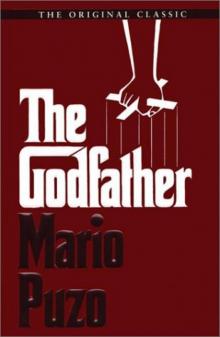 The Godfather
The Godfather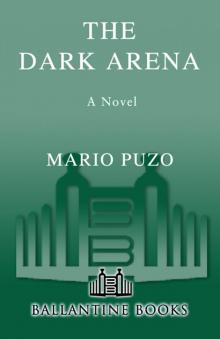 The Dark Arena
The Dark Arena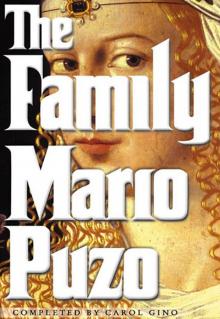 The Family
The Family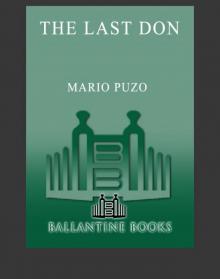 Last Don
Last Don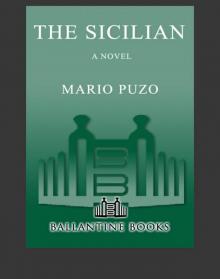 The Sicilian
The Sicilian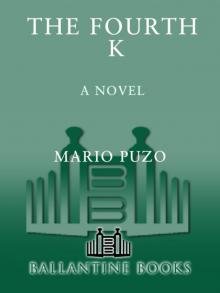 The Fourth K
The Fourth K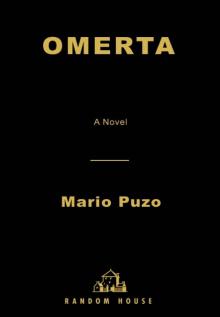 Omerta
Omerta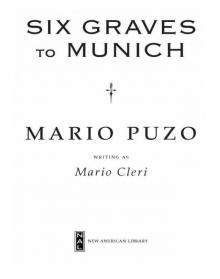 Six Graves to Munich
Six Graves to Munich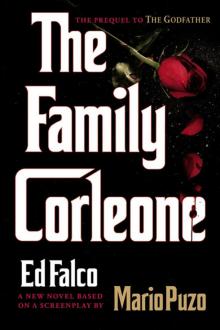 The Family Corleone
The Family Corleone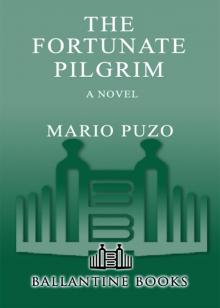 The Fortunate Pilgrim
The Fortunate Pilgrim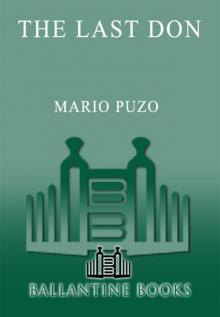 The Last Don
The Last Don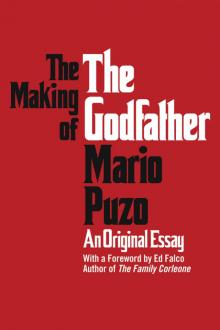 The Making of the Godfather
The Making of the Godfather Fools die
Fools die The Sicilian (v2.0)
The Sicilian (v2.0)